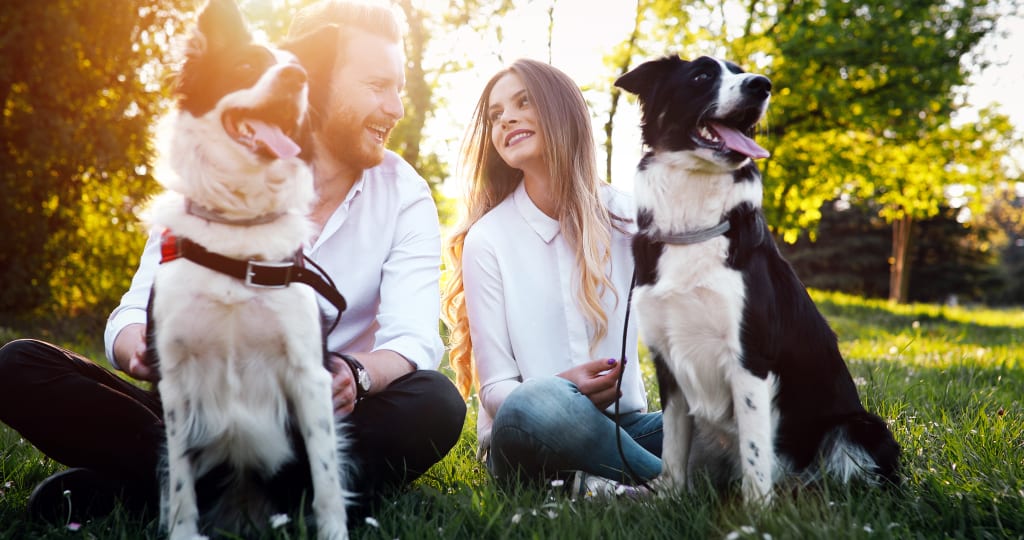Five Things to Consider if You Have More Than One Dog
Advice for Multi-Dog Households

Dogs are great. They’re wonderful furry friends who add so much to our lives that they become fully-fledged members of our families. Many people include their dogs in their lives, so much so that the lines between pet and sibling become blurred. However, if you have more than one dog in your home, there are a few things to consider.
1. Boundaries are necessary.
Dogs are pack animals. It’s why they’re so social, follow us around, and have adapted to domesticated life so easily. They are also prone to getting lonely, and they can suffer from separation anxiety more than other animals.
However, remember that because they are pack animals, they need boundaries. Packs need leaders and submissives, that means in each "pack" there is an alpha who calls the shots. Without some social structure or limits, the pack is unsettled.
In your home, you need to be the alpha. That way, you are in charge, and you are responsible for protecting them, training them and providing them with food and shelter. Once there is a clear alpha, which is you, your dogs will soon appoint their own structure.
When they have a general structure in terms of unacceptable behavior, places they’re not allowed to go, or things that they cannot touch, they’ll understand the social dynamics. From there, they should be more at ease - and you will be too!
2. They are all different.
Just like every person is different, every dog is different. They will have individual needs when it comes to mental and physical exercise, food and sleep. Whether you get two dogs at the same time, or you get one and then get another one, you cannot assume that they have the same needs.
For example, one of my dogs is cuddly, and one isn’t. One likes socializing with other dogs who aren’t in our pack, and the other gets nervous. Their dietary needs differ, too, even though they are from the same litter. No matter if your dogs are pedigree, rescues, related or not, they will be different.
Everything about dogs can be catered to, and there are companies out there who can design tailor-made diets, exercise, and training plans, and even personalized toys for your precious pooches. There has been a recent surge in the number of companies offering bespoke training programs, subscription boxes of treats and toys, and even shampoos and clothes.
There is nothing you cannot find for your dog, and while they may not know if you dress them the same, they’ll know if they don’t like something. That means you’ll know, too, so it’s up to you to listen to your pup when they refuse to eat something, wear something, or do something.
3. They need their own space.
No matter how small or large your dogs are, and whether or not they share a bed, a bowl or the whole home, it is good to provide each dog with their own space. Whether this is their own bed or a metaphorical separation, it’s integral for them.
We all need our own time, space, and belongings, no matter how much we love our partner or family. Your dogs are the same. While they are social, and it might seem as if you can’t get a moment to yourself from your furry shadows, they do need their own space. Whether or not you allow them into your bed, up the stairs, or in certain rooms is up to you. However, you should try to provide them with things that are "theirs."
This helps to provide them with a sense of security and safety, particularly when it comes to food and "hiding spots." A lot of people with more than one dog have only one water dish, which often works well. However, when it comes to food, it’s crucial that each dog is given their own dish, and, if necessary, is fed separately.
One thing that each dog, or each household with dogs, should have is a dog bed. This should be on the floor, and shown to them as theirs. This will let them know they can access it whenever they want, and that they can go there when they want to feel comfortable. They may share this space with each other, but it should be a dogs-only or dog-priority space.
4. They will fight.
No matter how well your dogs get along day-to-day, there will come a time when they fight. This is more often than not when they are upset. If they are upset in their daily routine, they may forget the boundaries they have set for themselves. Each dog will have its own role in the pack, and if this becomes upset, they might get confused and fight.
Like siblings, dogs will annoy each other, fight each other, and generally get on each others’ nerves. Most often, the fights will only amount to wrestling, snapping at each other, or growling. However, it can happen that they do fight. When they fight, it often sounds worse than it is.
If your dogs fight, and you can’t separate them by shouting, or you’re afraid of getting bitten yourself, throw some water over them. That should separate them. Then, divide them into different rooms and scold them. They will need some "cooling off" time, and it’s up to you to provide this.
They may be off or temperamental for a few days after a fight like that, but it will all settle down again. Be cautious of them becoming territorial over toys, food, people, or beds in the meantime.
5. They need humans, too.
No matter how comfortable your dogs are with each other, and how independent they may seem–particularly if you have a dog door–they do need humans. They will look to you for comfort when they’re scared, mainly during thunderstorms or fireworks, or if they’re sick. Many people have found that if they have more than one dog, their dogs lick each other's ears and eyes, which can reduce infections, but they need you to check on them, too.
They may not speak English the same way that we do, but they are more than able to communicate with us when something is wrong. If you notice your dog is a bit despondent, mopey, or has lost interest in things it enjoyed, you should bring them for a check-up. You will know your dog better than anyone, so if you think something is wrong, then check it out.
They also need you for shelter, love, and food. They want you to let them know they are safe and secure, and that they don’t need to fight for food, or water, or safety. If you can provide them with this consistently, it will make them settle down better at night, and reduce their fighting.
They may have their own pack, and do "dog things" without you, like wrestling, teaming up against other dogs, or playing with toys, but they do need their humans. They cannot groom themselves, cut their own nails or clean up after themselves, so it’s up to you to ensure you provide them with these basic care essentials.
No matter how many dogs you have–from two to twenty–the above five points are relevant to all packs. The important thing is to remember to enjoy your time with them: there will never be a dull moment!
About the Creator
Donna Maurer
Donna is a hustling freelance writer who spends her time writing about everything from the music industry to the latest beauty and wellness trends. She contributes to numerous blogs and enjoys sharing insights from her own life experiences.






Comments
There are no comments for this story
Be the first to respond and start the conversation.